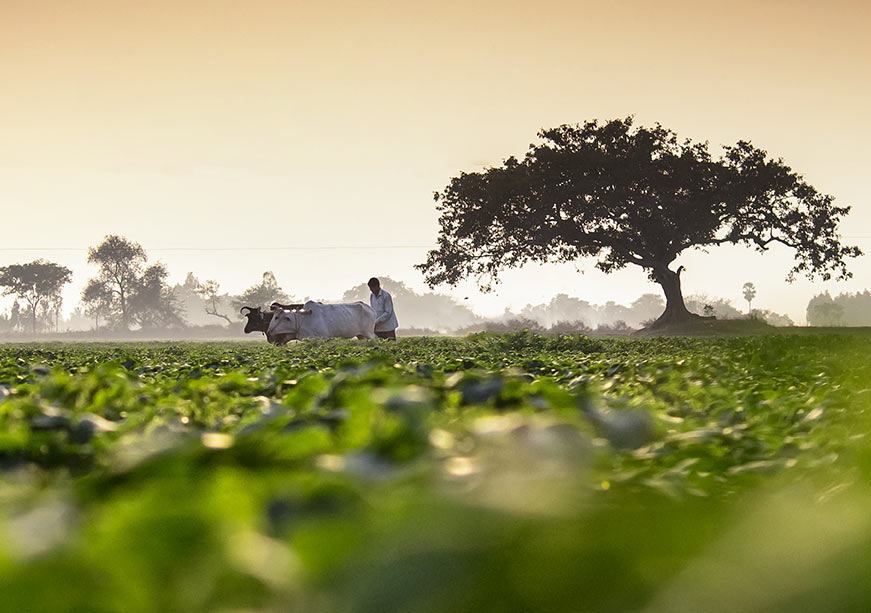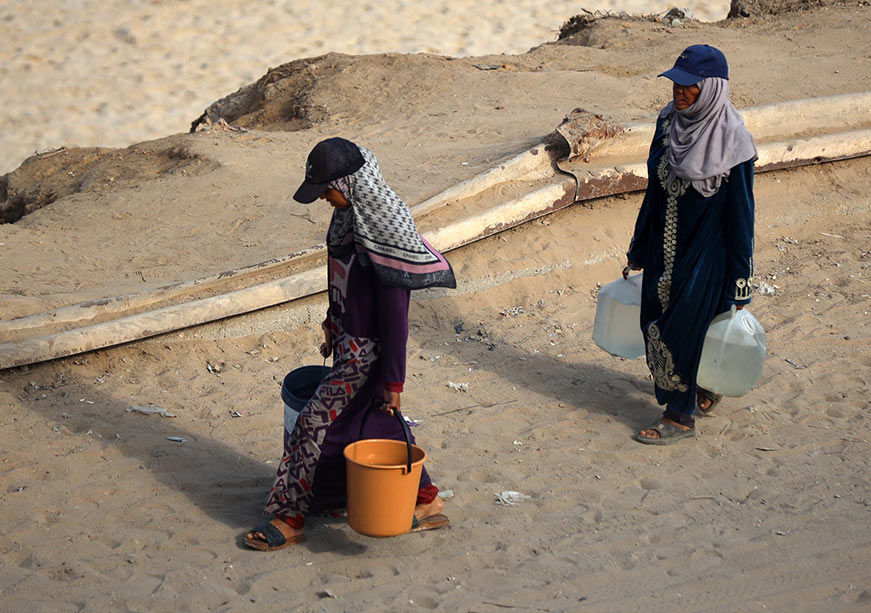Historically, the nexus between agriculture, food systems, land degradation, and climate has rarely occupied centre stage at annual climate negotiations, despite the agricultural sector contributing to nearly one-third of global greenhouse gas emissions. However, agricultural issues have gained traction in recent years, especially at the Conference of the Parties (COPs). COP23 launched the ‘Koronivia Joint Work on Agriculture’ (KJWA), and COP27 in Sharm el-Sheikh initiated a joint work plan to implement KJWA outcomes. COP28 further reinforced its importance through the UAE Declaration on Sustainable Agriculture, Resilient Food Systems, and Climate Action, which urges countries to integrate agriculture and food systems into their nationally-determined contributions (NDCs) and National Adaptation Plans by 2025.
The transformation of agriculture and food systems will encompass a central pillar of the COP agenda.
For the first time, the transformation of agriculture and food systems will encompass a central pillar of the COP agenda. This shift reflects the dual identity of the upcoming host, Brazil, whose agricultural dominance and rich Amazon rainforests often exist in competition rather than in harmony. While the formal negotiation process remains multilateral and consistent across annual summits, COP Presidents retain autonomy in shaping the Action Agenda’s thematic priorities. Some hosts pursue new ambitions to cement a certain legacy, potentially perpetuating a “boom-bust” cycle where new announcements obscure delivery. Brazil, on the other hand, intends to keep implementation at the core of its agenda. This article argues that Brazil is poised to advance agricultural transformation through an implementation-focused agenda. Still, challenges regarding mobilising climate finance and navigating internal political conflicts may hinder its success.
Spotlighting Locally-Rooted Climate-Resilient Agriculture and Food Systems
The COP30 agenda offers both formal and informal opportunities to synergise resilient food and agriculture frameworks launched through recent prior convenings, such as the Convention on Biological Diversity or UNCCD. These efforts build upon the three sequential COPs on biodiversity, climate change, and desertification in 2024, demonstrating incremental progress in fostering space to discuss agri-food systems and acknowledging the rights of smallholder farmers, including Indigenous Peoples and local communities.
COP30 places agriculture transformation at the core of its agenda and plans to initiate formal processes to catalyse implementation. Brazil intends to launch activation groups to review over 300 previously launched COP initiatives and develop cohesive frameworks to unify approaches and unlock collective action. This will include initiatives on land restoration, sustainable agriculture, resilient food systems, and access to food and nutrition. Additionally, Brazil’s Ministry of Social Development is preparing the Belém Declaration on Hunger and Poverty to position food security and social protection at the centre of climate action.
COP30 places agriculture transformation at the core of its agenda and plans to initiate formal processes to catalyse implementation.
However, there is equal merit to advancing agricultural transformation in the conference peripherals or informal settings, such as side events, which enable knowledge-sharing between stakeholders and reflect more of a bottom-up approach. Reducing agricultural emissions requires highly context-specific and locally-tailored approaches, unlike the energy transition, which has well-known scalable solutions with clear returns on investment. Brazil is embracing muritáo, a concept underscoring the roles of local communities and indigenous groups in the agenda-setting process. The People’s Summit plans to convene social movements, grassroots organisations, traditional peoples and communities to showcase agroecology strengths and set forth strategies for regenerative agriculture and soil management. The thematic day for Agriculture, Food Systems, Food Security, Fisheries, and Family Farming will also facilitate engagement to catalyse partnerships and cross-sharing of good practices, keeping in line with plans to emphasise “implementation”.
Overcoming Financing Challenges
Localised solutions to bolster resilient agriculture exist, but scaling requires financing. COP30 offers a potential gateway to mobilise financing for the agricultural sector and small-scale farmers. This includes developments in the Baku-to-Bélem Roadmap and the launch of the Resilient Agriculture Investment for Net-Zero Land Degradation initiative, which intends to help countries develop systems to mobilise and direct climate funding to farmers seeking to restore their land and complements other upcoming financing initiatives such as the Tropical Forest Forever Facility.
Currently, investments for agrifood systems transformation account for only 4.3 percent of total mitigation and adaptation finance, or roughly US$ 60-75 billion. This is far below the US$1.1 trillion required to meet Paris Agreement emissions reduction targets. Smallholder farmers, who produce one-third of the world’s food supply, receive only 0.8 percent of climate finance annually, leaving them susceptible to climate shocks. The two biggest global climate funds are falling short in ensuring financing reaches grassroots farmer organisations. However, agriculture offers promising entry points for private companies, with the sector comprising the largest share of recent deals in blended finance data.
Smallholder farmers, who produce one-third of the world’s food supply, receive only 0.8 percent of climate finance annually, leaving them susceptible to climate shocks.
Financial obstacles primarily stem from the uncertainty of financial returns, fragmented food production and coordination across the food value chain, and inconsistent impact reporting. Thus, attention needs to be directed towards developing a three-fold approach which involves developing tailored agriculture solutions, de-risking investments, and improving impact assessments measuring climate finance co-benefits. Given the context of falling official development assistance across Western countries, derisking investments to attract private financing for adaptation will remain a challenging feat. Additionally, the new collective quantified goal (NCQG) on climate finance launched at COP29 as part of the Baku-Bélem Roadmap is riddled with inefficiency and a lack of clarity, which will need to be smoothed over at COP30. The UNFCCC expert group has finalised the first set of adaptation indicators under the UAE Framework on Global Climate Resilience, with 10 proposed indicators directed to the food and agriculture sector. Each would assess efforts to respond to climate shocks, capture adaptation practices, establish agrifood frameworks, track land degradation, agricultural losses, and food insecurity.
Progress on the loss and damage fund could also benefit smallholder farmers. At COP30, the fund will launch a call for project proposal submissions. This type of funding would support farmers in implementing climate-resilient technologies to increase productivity and resistance to climate shocks, and produce positive ripple effects on food security and economic growth.
Progress and Polarisation Shape the Brazilian Context
Given the range of climate disasters in recent years, Brazil has instituted stronger resilience policies, increasingly encouraging private sector investments. Overall, the country is progressing in prioritising low-carbon agriculture through its national policies, which largely focus on converting degraded land and pushing for sustainable fuel alternatives. Brazil’s Plan for Adaptation and Low Carbon Emission in Agriculture (ABC+ Plan) incorporates new practices to reduce up to 1.1 billion tons of CO2eq in the agricultural sector through the adoption of Sustainable Systems, Practices, Products, and Production Processes (SPSABC) in 72.68 million hectares by 2030. Brazil is also working to convert degraded and deforested areas into agriculture and livestock, aimed at covering 40 million hectares through its Caminho Verde Program. Lastly, Brazil’s National Policy for Biofuels mandates biofuel mixes which generate clean energy from agricultural waste such as sugarcane waste and manure.
The Sustainable Fuel Pledge should thus include a clear caveat that no land should be converted for crop cultivation to accommodate increased biofuel production.
These national policies are informing Brazil’s global positioning and proposals for the COP30 agenda. However, these policies also expose contradictions that could complicate Brazil’s narrative as a credible climate leader at COP30. For instance, the ABC Plan advocates for crop diversification, but realistically combines two to four monocultures. Brazil also recently launched the Bélem Commitment for Sustainable Fuels, an initiative to garner political support to quadruple production and use of sustainable fuels such as hydrogen, biogases, biofuels, and synthetic fuels by 2035. Although advocating for a shift away from fossil fuels is crucial, biofuel expansion also ironically risks perpetuating deforestation. Biofuel production has historically contributed to deforestation in Southeast Asian countries, producing biofuel from palm oil for the EU’s transport sector and reducing land for food production in other regions. The Sustainable Fuel Pledge should thus include a clear caveat that no land should be converted for crop cultivation to accommodate increased biofuel production.
Other internal divisions exist between environmentalists and agribusiness leaders in Brazil, limiting the country’s ability to garner appeal as climate justice leaders. Agribusinesses are preparing to position themselves as fundamental climate transition stakeholders, showcasing advanced best practices in sustainable agriculture, overshadowing their disproportionately large contributions to greenhouse gas emissions. These contradictions are exemplified by recent bills passed in Brazil to overhaul environmental permitting and suspend a soy moratorium, which would make way for further deforestation and destruction of communities. These internal dynamics, characterised by ambition and division, will shape how Brazil approaches sustainable agriculture at COP30.
Conclusion
The symbolic selection of the Amazon as the venue for COP30 marks a convergence of cross-cutting issues and a potential acceleration point for agriculture to emerge as a priority area to target for emissions reductions and financing. However, the remote location poses logistical barriers for many nonprofits and civil society groups, and Brazil must also navigate internal divisions to set forth a genuine and united front. For COP30 to succeed in catalysing transformations in agriculture and food systems, it will need to ensure commitments to implementation yield tangible outcomes, extending beyond declarations to leverage, finance, and scale locally-led solutions.
Leigh Mante is a Junior Fellow, Climate and Energy at ORF Middle East.











